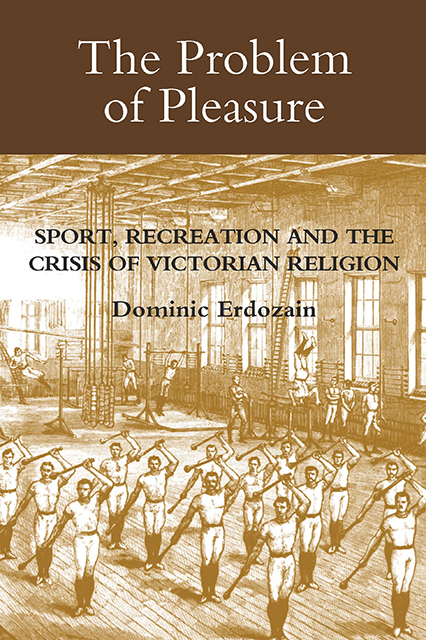Book contents
- Frontmatter
- Contents
- List of Illustrations
- Acknowledgements
- Abbreviations and Note on Conventions
- Introduction
- 1 ‘Born Free and Everywhere in Chains’: Evangelicalism and the Problem of Pleasure
- 2 Romanticism With Boots on: The Virtues of Sport
- 3 Renegotiating the Secular: The Coming of Recreation to the Mid-Victorian Religious World
- 4 ‘We are all Cyclists Now’: Applying the Pleasure Principle
- 5 Sport and the Secularisation of Late-Victorian Youth Ministry
- 6 Contesting the Sacred: The Late-Victorian Church and the ‘Gospel of Amusement’
- Conclusion
- Bibliography
- Index
5 - Sport and the Secularisation of Late-Victorian Youth Ministry
Published online by Cambridge University Press: 02 March 2023
- Frontmatter
- Contents
- List of Illustrations
- Acknowledgements
- Abbreviations and Note on Conventions
- Introduction
- 1 ‘Born Free and Everywhere in Chains’: Evangelicalism and the Problem of Pleasure
- 2 Romanticism With Boots on: The Virtues of Sport
- 3 Renegotiating the Secular: The Coming of Recreation to the Mid-Victorian Religious World
- 4 ‘We are all Cyclists Now’: Applying the Pleasure Principle
- 5 Sport and the Secularisation of Late-Victorian Youth Ministry
- 6 Contesting the Sacred: The Late-Victorian Church and the ‘Gospel of Amusement’
- Conclusion
- Bibliography
- Index
Summary
I did not lose my faith, but other things took a more prominent place in my mind. (Edmund Gosse, Father and Son, 1907)
The old theology did not perish under the assault of a rival system. It did not quail before a logic more rigorous than its own. Scarcely have the rudiments of any such system yet appeared. It expired because an atmosphere had been created in which it could not breathe.
(Josiah Conder, International Congregational Council, 1891)
To speak of secularisation in the context of the Victorian religious ‘boom’ is to commit a double heresy: first, because it glosses the ‘nuances’ of religious change; second, because ‘secularisation’, long moralised as the possession of ‘pessimists’, is regarded as an ideological stance. One reason the authors of Redefining Christian Britain (2007) have taken such a strong line on this ‘theoretical Cuba’ – ‘the last great teleological narrative left standing’ – is because they regard it as a dangerous tool in the hands of both ‘secularists imagining the final demise of religion’ and ‘some Christians, particularly (but not exclusively) evangelicals, who dream of a return to apostolic purity’. ‘These two interested parties’, they contend, ‘have to an extent colluded in endorsing the secularization thesis.’ It is the persistence of such writers in conflating ‘secularisation’ with the nomothetic hubris of ‘the secularization thesis’, caricaturing it as the comforting bromide of atheists and end times-crazed fundamentalists, that represents the real departure from historical reasoning. Far from any ideological imposition on the subject matter, secularisation, understood as the gradual attenuation of supernatural reference and recourse, is an eminently historical process. In describing it, even in the context of Victorian ‘activism’, we are neither dabbling with teleologies nor heaping condescension on the past. Secularisation was a risk factored into the great load-sharing experiments of this period and the religious architects who conducted them would have been astonished that the ethicised ‘religion’ that so often emerged could be so neatly notched up to Christian progress. ‘Virtue’ – even virtue with links to Christian faith – was no unambiguous bulwark of ‘Christian Britain’; it was, as Himmelfarb notes, regarded by many Victorians as ‘a surrogate for God’. The emergence of non-transcendent morality is the heart of the phenomena of secularisation. My contention is that recreation – that most un-churchy, free-standing motor in the salvation industry – was in its vanguard.
- Type
- Chapter
- Information
- The Problem of PleasureSport, Recreation and the Crisis of Victorian Religion, pp. 199 - 229Publisher: Boydell & BrewerPrint publication year: 2010



